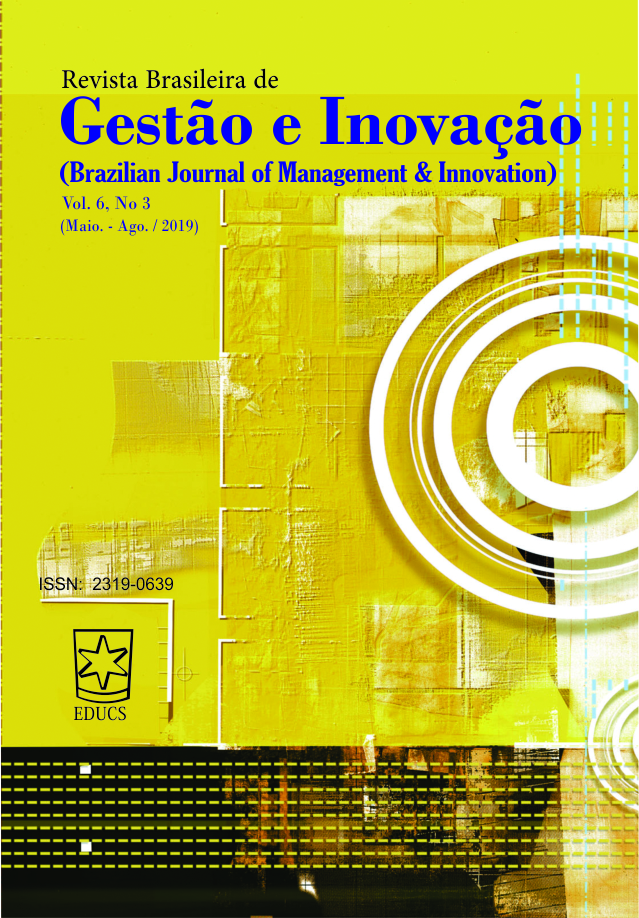QUALIDADES DE LIDERANÇA PARA A INOVAÇÃO EM ORGANIZAÇÕES DO SETOR PÚBLICO | LEADERSHIP QUALITIES FOR INNOVATION IN PUBLIC SECTOR ORGANIZATIONS
Keywords:
Liderança, Capacidade de inovação, Qualidades de LiderançaAbstract
As organizações públicas têm sofrido transformações constantes em suas práticas de gestão e organização do trabalho, o que aumenta a importância da capacidade de inovação e da liderança no sucesso e crescimento desses órgãos.Entretanto, a tríade liderança-inovação-setor público tem sido pouco explorada e não tem recebido a atenção merecida. Isso posto, este artigo almeja identificar as qualidades atribuídas ao líder que podem impactar a capacidade de inovação em organizações do setor público. Para tanto, utilizou-se o método de pesquisa bibliográfico e documental.O estudo é qualitativo em relação ao objetivo, e descritivo no que se refere à abordagem. Quanto aos resultados, observou-se 10 qualidades essenciais à liderança no setor público brasileiro que potencializam a capacidade de inovação. Concluiu-se que as qualidades dos líderes inovadores no setor público estão prioritariamente relacionadas às habilidades humanas dos líderes, ou seja, à capacidade de lidar com os membros do grupo. Além disso, para inovar no setor público brasileiro o líder não precisa, necessariamente, dominar todos os conhecimentos técnicos das atividades desenvolvidas. Como contribuição, as qualidades discutidas neste estudo podem auxiliar os gestores públicos brasileiros e seus liderados a percorrerem a inovação.
-----
DOI: 10.18226/23190639.v6n3.06
Felipe Guilherme de Oliveira Melo*, Universidade Federal da Bahia (UFBA). Brasil.
E-mail: felipeguilherme1@gmail.com
Glessia Silva, Universidade Federal de Sergipe (UFS). Brasil.
E-mail: glessiasilva@hotmail.com
Submetido: Abril 2018
Aceito: Setembro 2018
*Contato para Correspondência
Downloads
Published
How to Cite
Issue
Section
License
The author must guarantee that:
- there is full consensus among all the coauthors in approving the final version of the document and its submission for publication.
- the work is original, and when the work and/or words from other people were used, they were properly acknowledged.
Plagiarism in all of its forms constitutes an unethical publication behavior and is unacceptable. Revista Brasileira de Gestão e Inovação has the right to use software or any other method of plagiarism detection.
All manuscripts submitted to RBGI - Revista Brasileira de Gestão e Inovação go through plagiarism and self-plagiarism identification. Plagiarism identified during the evaluation process will result in the filing of the submission. In case plagiarism is identified in a manuscript published in the journal, the Editor-in-Chief will conduct a preliminary investigation and, if necessary, will make a retraction.
This journal, following the recommendations of the Open Source movement, provides full open access to its content. By doing this, the authors keep all of their rights allowing Revista Brasileira de Gestão e Inovação to publish and make its articles available to the whole community.
RBGI - Revista Brasileira de Gestão e Inovação content is licensed under a Creative Commons Attribution 4.0 International License.
Any user has the right to:
- Share - copy, download, print or redistribute the material in any medium or format, linking to RBGI site.
- Adapt - remix, transform and build upon the material for any purpose, even commercially.
According to the following terms:
- Attribution - You must give appropriate credit, provide a link to the license, and indicate if changes were made. You may do so in any reasonable manner, but not in any way that suggests the licensor endorses you or your use.
- No additional restrictions - You may not apply legal terms or technological measures that legally restrict others from doing anything that the license permits.
#RBGI







